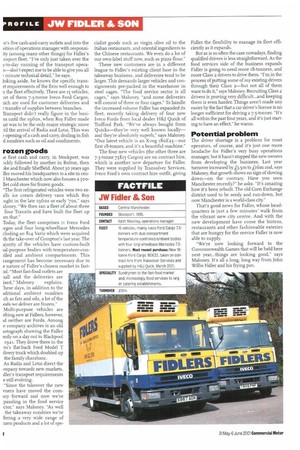-n's five cash.and.carry outlets and into the sition of operations
Page 38

If you've noticed an error in this article please click here to report it so we can fix it.
manager with responsi. ity (among many other things) for Fidler's nsport fleet. "I've only just taken over the y-to-day running of the transport opera. n—don't expect me to be able to give you all minute technical detail," he says.
Faking aside, he knows the specific transrt requirements of the firm well enough to a the fleet effectively. There are 15 vehicles, 3st of them 7.5-tonne Iveco Ford Cargos, lich are used for customer deliveries and transfer of supplies between branches. Transport didn't really figure in the busiss until the 1960s, when Roy Fidler made iat was to be the only major strategic move Ail the arrival of Radia and Lotai. This was opening of a cash and carry, dealing in fish
d sundries such as oil and condiments.
rozen goods
le first cash and carry, in Stockport, was .ickly followed by another in Bolton, then Dice and finally Sheffield. About 30 years ago Iler moved his headquarters to a site in cen. 1 Manchester which now also houses a 500llet cold store for frozen goods.
"The first refrigerated vehicles were two exalls ice cream delivery vans which Roy ught in the late 196 05 or early '7os," says aloney. "We then ran a fleet of about three four Transits and have built the fleet up mi that."
Today, the fleet comprises ri Iveco Ford irgos and four long-wheelbase Mercedes cluding an 814 Vario which were acquired th the take-over of Compton's last year. The ajority of the vehicles have custom-built 'al-purpose bodies with temperature-con)11ed and ambient compartments. This rangement has become necessary due to
e nature of Fidler's chosen market in fast' ad. Most fast-food outlets are aall and the deliveries are ixed," Maloney explains. 'hese days, in addition to the iditional ambient sundries .ch as fats and oils, a lot of the iods we deliver are frozen." Multi-purpose vehicles are )thing new at Ficllers, however, id neither are Fords. Among e company archives is an old iotograph showing the Fidler mily on a day out to Blackpool 1921. They drove there in the .m's flat-back Ford Model T !livery truck which doubled up the family charabanc.
As Radia and Lotai direct the impany towards new markets, dler's transport requirements e still evolving.
"Since the takeover the new vners have moved the cornmy forward and now we're :panding in the food service 'ctor," says Maloney. "As well the takeaway sundries we're Tering a very wide range of Dzen products and a lot of spe cialist goods such as virgin olive oil to the Italian restaurants, and oriental ingredients to the Chinese restaurants. We even do a lot of our own-label stuff now, such as pizza flour."
These new customers are in a different league to Fidler's existing client base in the takeaway business, and deliveries tend to be larger. This demands larger vehicles and consignments pre-packed in the warehouse in steel cages. "The food service sector is all cages,says Maloney, and some deliveries will consist of three or four cages." To handle the increased volume Fidler has expanded its fleet, recently taking delivery of four new Iveco Fords from local dealer H&J Quick of Trafford Park. "We've always bought from Quicks—they're very well known locally— and they're absolutely superb," says Maloney. "Our latest vehicle is an X-reg 18 oE23—our first 18-tonner, and it's a beautiful machine."
The four new vehicles (the other three are 7.5-tonne 75E15 Cargos) are on contract hire, which is another new departure for Fidler. They were supplied by Transolver Services, Iveco Ford's own contract hire outfit, giving Fidler the flexibility to manage its fleet efficiently as it expands.
But as is so often the case nowadays, finding qualified drivers is less straightforward. As the food services side of the business expands Fidler is going to need more f8-tonners, and more Class 2 drivers to drive them. "I'm in the process of putting some of my existing drivers through their Class 2—but not all of them want to do it," says Maloney. Recruiting Class 2 drivers is proving very difficult...and keeping them is even harder, Things aren't made any easier by the fact that a car driver's licence is no longer sufficient for driving a 7.5-tanner. "It's all within the past four years, and it's just starting to have an effect," he warns.
Potential problem
The driver shortage is a problem for most operators, of course, and it's just one more headache for Fidler's very busy operations manager, but it hasn't stopped the new owners from developing the business. Last year turnover increased by L3.5m to Lf6m and, says Maloney, that growth shows no sign of slowing down—on the contrary. Have you seen Manchester recently?" he asks. "It's amazing how it's been rebuilt. The old Corn Exchange district used to be seedy and run-down, but now Manchester is a world-class city" That's good news for Fidler, whose headquarters is just a few minutes' walk from the vibrant new city centre. And with the new development have come the bistros, restaurants and other fashionable eateries that are hungry for the service Fidler is now able to supply.
"We're now looking forward to the Commonwealth Games that will be held here next year...things are looking good," says Maloney. It's all a long, long way from John Willie Fidler and his frying pan.
































































































